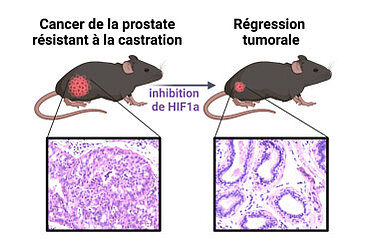Prostate cancer: a new therapeutic approach
Prostate cancer is the most common male cancer and the second most common cause of cancer death in industrialized countries. In its advanced stages, this cancer is treated with hormone therapy, a treatment that aims to suppress the production of androgens. However, the development of resistance to these treatments by the tumor cells limits its long-term effectiveness. In a study published in the journal Embo Molecular Medicine, Dr. Metzger's team highlights the involvement of hypoxia transcription factor 1 alpha (Hif1a), which allows cells to adapt to the lack of oxygen, in the development of this resistance. The scientists show that inhibiting this factor allows the regression of tumors and thus provides a promising approach for the development of new treatments.

For early prostate cancer, surgery or radiation therapy is sufficient to cure many patients. However, for advanced forms, these strategies are no longer sufficient and androgen deprivation therapy becomes the cornerstone of management. This therapy can make the tumors regress for a while, but many of them eventually develop resistance. This is called castration-resistant prostate cancer.
At this stage, the available treatments are not very effective and cause adverse effects that affect the quality of life of patients.
In this article, researchers highlight the importance of the hypoxia transcription factor 1 alpha (Hif1a) in the development of castration resistance. Hif1a is a protein that allows cellular adaptation to hypoxia, the scarcity of oxygen. Using mouse models in which Hif1a is inactivated in prostate tumor cells, they show that tumors regress after castration. Furthermore, they demonstrate that inhibition of this factor by pharmacological treatment allows tumors to regress, even after castration resistance has been established. These results were confirmed in human prostate cancer cell lines.
These pre-clinical data are very promising and suggest that a clinical trial combining androgen deprivation therapy with Hif1a inhibition may improve patient outcomes.
Mutation of the PTEN gene in prostate epithelial cells induces the formation of prostate tumors resistant to androgen deprivation therapy. In contrast, co-mutation of HIF1a or pharmacological inhibition of this factor results in regression of these tumors.
